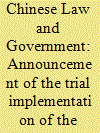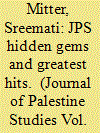| Srl | Item |
| 1 |
ID:
113083


|
|
|
| 2 |
ID:
095930


|
|
|
|
|
| Publication |
2010.
|
| Summary/Abstract |
The central themes to be addressed during the Doha Round of the world trade negotiations are the reduction of the agricultural production and export subsidies and improved market access for agricultural and non-agricultural goods. The G-20 group wields enough power to press negotiations at the Doha Round toward lower agricultural trade barriers and production and export subsidies. The objective of this study is to determine the impacts of the Doha Round on the economies of Brazil, China, and India. The Global Trade Analysis Project's (GTAP) general equilibrium model and database (version 7) are used. The Doha Round scenarios simulated in this paper consider the WTO agricultural production and export subsidy reduction requirement, and the application of the Harbinson approach, and Swiss formula to reduce import tariffs. Brazil and China present the highest GDP growth rate varying from 0.4 % to 1.4%. India shows a negative GDP growth rate in all scenarios, except in that which replicates the Uruguay Round. The welfare gains are positive, but small, for Brazil, China and India. The GDP loss observed in the economies of the EU25 and the US may make it difficult to reach a trade agreement at the Doha Round.
|
|
|
|
|
|
|
|
|
|
|
|
|
|
|
|
| 3 |
ID:
178798


|
|
|
|
|
| Summary/Abstract |
In addition to selecting a “greatest hit” and a “hidden gem,” here, Sreemati Mitter provides readers with a broad overview of Journal of Palestine Studies (JPS) content on the topic of capitalism in Palestine. Mitter singles out Alexander Schölch’s classic, “The Economic Development of Palestine, 1856–1882” (1981) as a greatest hit and Peter Lagerquist’s haunting “Vacation from History: Ethnic Cleansing as the Club Med Experience” (2006) as a hidden gem. Read together, she argues, these two pieces help elucidate how powerful forces of global market capitalism converged on Palestine’s storied Mediterranean coast to shape its economy in the modern period.
|
|
|
|
|
|
|
|
|
|
|
|
|
|
|
|
| 4 |
ID:
113080


|
|
|
| 5 |
ID:
141262


|
|
|
|
|
| Summary/Abstract |
The defining challenge of sustainable agriculture is the production of food and other agricultural products at an environmental cost that does not jeopardize the food security and general welfare of future generations. Feeding another three billion people in the face of climate change, biodiversity loss, and an environment already saturated with excess nitrogen and other reactive pollutants requires new approaches and new tools in the design and deployment of workable solutions. Solutions will be local but all will require an ecological systems approach that considers sustainable farming practices in the full context of ecosystems and landscapes. And their deployment will require an understanding of the social systems capable of building incentives that produce socially desired outcomes. Socioecological models for agriculture provide an opportunity to explore feedbacks, trade-offs, and synergies that can optimize and strengthen emerging connections between farming and society. With the right incentives, innovative research, and political will, a sustainable agriculture is within our reach.
|
|
|
|
|
|
|
|
|
|
|
|
|
|
|
|